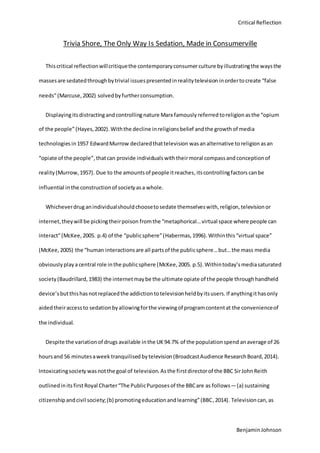
Published Essay
- 1. Critical Reflection BenjaminJohnson Trivia Shore, The Only Way Is Sedation, Made in Consumerville Thiscritical reflectionwillcritiquethe contemporaryconsumerculture byillustratingthe waysthe massesare sedatedthroughbytrivial issuespresentedinrealitytelevision inordertocreate “false needs”(Marcuse,2002) solvedbyfurtherconsumption. Displayingitsdistractingandcontrollingnature Marx famously referred toreligion asthe “opium of the people”(Hayes,2002).Withthe decline inreligionsbelief andthe growthof media technologies in1957 EdwardMurrow declaredthattelevision wasanalternative toreligion asan “opiate of the people”,thatcan provide individuals withtheirmoral compassand conceptionof reality(Murrow,1957). Due to the amountsof people itreaches, itscontrollingfactors canbe influential inthe constructionof societyasa whole. Whicheverdruganindividualshouldchoosetosedate themselveswith,religion,televisionor internet,theywill be pickingtheirpoison fromthe “metaphorical…virtual space where people can interact”(McKee,2005. p.4) of the “publicsphere”(Habermas,1996).Withinthis“virtual space” (McKee,2005) the “human interactionsare all partsof the publicsphere…but…the mass media obviouslyplayacentral role inthe publicsphere (McKee, 2005. p.5).Withintoday’smediasaturated society(Baudrillard,1983) the internetmaybe the ultimate opiate of the people throughhandheld device’sbutthishasnotreplacedthe addictiontotelevisionheldbyitsusers.If anythingithasonly aidedtheiraccessto sedationbyallowingforthe viewingof programcontentat the convenienceof the individual. Despite the variationof drugs available inthe UK 94.7% of the populationspend anaverage of 26 hoursand 56 minutesaweek tranquilised by television(BroadcastAudience ResearchBoard,2014). Intoxicatingsociety wasnotthe goal of television.Asthe firstdirectorof the BBC SirJohnReith outlinedinits firstRoyal Charter“The PublicPurposesof the BBCare as follows—(a) sustaining citizenshipandcivil society;(b) promotingeducationandlearning”(BBC,2014). Television can,as
- 2. Critical Reflection BenjaminJohnson the BBC say intheirmodernday missionstatement,be used“Toenrichpeople'sliveswith programmesandservicesthatinform,educate andentertain” (BBC,2014) as a contributiontoa Knowledgesociety. A knowledge society“isasocietywithaneconomyinwhichknowledge is acquired,created,disseminatedandappliedtoenhance economicandsocial development.”(Gesci, 2014). The vast range of televisionchannelsavailable todayallowsforviewers tobe sedated,or educatedif theydesire,by programsonnearlyevery subjectwithmanychannels specializingin one genre,forexample the Historychannel orthe DiscoveryScience channel offerspecificeducational programming. Asthese channels andthe intentof the BBC demonstrate televisioncanhelpinthe educationof individualsand,due tothe amountsof people itreaches,can influence the education of societyasa whole. Howevermanychannelsandprogramshave farmore sedative qualities and“deal exclusivelyin triviality”(McKee, 2005.p.32). Triviaas definedbythe OxfordDictionaryas“details,considerations, or piecesof informationof little importance orvalue”(OxfordDictionary,2014),withprogramsof thisnature focusingtheircontentonsubjectssuchas;celebritygossip,domesticpractises,beauty regimes,sexualpractisesandotherareasof culturesnotholding little intellectual value(McKee, 2005). It isthisdifference invalue,andeducational potential,thatHabermas(1996) categorised as “commercial”and“commercialized”culture (Habermas,1996).“Commercial”culture islookedupon as qualityculture andisconsideredtobe more valuable,educational andcanengage society intellectuallytoitsoverall benefitandimprovement.Thiscategory of culture isaimedatthe more formallyeducated niche of society (Habermas,1996).“Commercialized”culture is aimedatthe less educated,massesof society.Itscontent islargelytrivial,“low minded…cynical andmade purelyfor profit(McKee,2005. p.83). “Commercialized”culture isconsumedmuchmore with television viewersandcanbe seenthroughoutmanygenres,one of whichisrealitytelevision.
- 3. Critical Reflection BenjaminJohnson InBritainrealityTV is one of the most populargenresof televisionandis mostpopularamongst the 18-30 demographic(BroadcastAudience ResearchBoard,2014) of televisionaddicts.Definedby the Oxford Dictionaryas“televisionprogramsinwhichreal peopleare continuouslyfilmed,designed to be entertainingratherthaninformative”(OxfordDictionary, 2014) Many realityTV showsfocus on social interactions,relationshipsandconsumptionof anindividual orgroup. Some of the most consumedprogramsinthisgenre are shows suchas; Geordie Shore,The Only Way Is Essex,The Valleys andMade inChelsea.Regularly overamillionpairsof glazedeyesview these programs at the time of airingand hundredsof thousandsmore after that(Broadcast Audience ResearchBoard,2014). Consumption of these showsinvolvesfollowingdifferentgroups of ‘friends’,indifferentplacesintermsof theirlocationcountryand social class, andviewing documentationof theirpersonalrelationshipsandcultural practicesin a waythat ispresentedtothe viewersasreal.There is a huge focuson the relationshipsof the charactersandtheirbehaviour patterns. Baudrillard (1983) demonstratesconsumptionispresentwithineverypartof an individual and everypartof a societystating“Neitherthe quantityof goods,northe satisfactionof needsis sufficienttodefine the conceptof consumption:theyare merelyitspreconditions”(Poster,2002. P.21), “isnot definedbythe foodwe eat,the clotheswe wear,the carwe drive,norbythe visual and oral substance of imagesand messages,butinthe organizationof all thisas signifying substance”(Poster,2002. P.21). Baudrillardexplains “Consumptionisacollectiveandactive behaviour,aconstraint,amorality, and an institution.Itisa complete systemof values,with all thatthe termimpliesconcerninggroup integrationandsocial control…consumersocietyisalsothe societyforthe apprenticeshipof consumption,forthe social indoctrinationof consumption.Inotherwords,thisisanew and specific mode of socialization”(Poster,2002. p.43).
- 4. Critical Reflection BenjaminJohnson A reductionor increase inthe level anindividual doesbelongordoesnot“to the system”,and therefore the levelsof systematicorganisation andamountof sedativespresent inanyindividual,is oftendependentonthe educationandsocial backgroundof the individual inquestion.Typicallythe highereducatedupperclassesbelonglesstothe system, orcouldbe seenas inthe bourgeoisie withinthe systemthatproduce the available formsof sedation,whilethe;lesseducated,proletariat, workingclassof societyare fullydependentonthe system, anditcanhave more of an impact onthe constructionof aspectsof theiridentity,suchasbehavioural patternsandmorals(McKee,2005) as theyconsume more of the available toxicsubstances. There isoftendebate aboutthe levelsortype of realitythatisportrayedon these shows,and withinthisgenre,andthe effectthiscanhave onthe consumer’sdefinitionof the real or reality. Consumersbelievingthatthese are real peopleactinginreal wayscreateswhatBaudrillard(1983) calleda “hyper-reality”definingitas“the generationbymodelsof areal withoutoriginorreality” (Baudrillard,1983).By engagingwiththishyper-realityregularlythe linesof distinctionbetween actual realityandthe created“hyper-real”worldbecome blurredtoanextentthatthe hyper-real consumed,becomesthe real withinsociety(Baudrillard,1983).Due to the consumer’sconfused definitionsthe contentof the programs,mainly charactersbehaviouralpatterns,becomereplicated withinsociety. Inthe casesof TOWIE andMade in Chelseathe contentis focused onthe observationof the wealthyupperclasses,payingspecialattentiontothe waytheirrelationshipsandconsumerhabits. Scenesofteninvolve characters;diningatexclusive restaurants,shoppinginhighendretail outlets or attendingparties,all while discussingtheirrelationshipsorpursuingthem. The presented characters,predominantly,are:self-centred,egotistical,talentlessandidioticindividuals thatdo nothingtocontribute tothe improvementof society andare completelyoblivioustothe “private sphere”(McKee,2005). Despite the idioticexamplesof behaviourpresentedhere are tame in comparisonstothe onesin Geordie Shore andThe Valleys.
- 5. Critical Reflection BenjaminJohnson Inthese programsthe focusof the contentison the binge drinkinghabitsandsexual activitiesof the presentedcharacters. Initssimplestformitis6 to 8 characters thatare placedina house,or locationsuchas a nightclubor hotel,thatisfilledwithcamerasto;drink,have sex andargue with each otherandthencommentate onthe eventsthatoccur. More oftenthannot an episode consist of the groupsdrinking,athome andthenin a publicarea, to a pointwhere theyare incapacitatedor preformaudacious sexuallyrelatedactsinpublicbefore returningtoahouse or hotel toeither; act like overgrownchildren,usuallyresultinginafoodfightsordestructive behaviour, orpreform furthersexual acts witheachother. All of whichis;glamorised,showntohave noconsequencesfor the characters and presentedasasociallyacceptable behavioural patternthatisthrough,showslike these,aviable careeroption. There isnopart of these showsthatdemonstrate the importance or value of beinganintelligentindividual witharegardforthe feelingsof others,insteadtheyfocuson “false needs”(Marcuse,2002) that furtherconsumeractivities. “False needs”(Marcuse,2002) are needscreatedbysocietythatsurround“true needs” (Marcuse, 2002) of humanbeings,suchas: waterand food (Marcuse,2002). Marcuse (2002) states““False”are those whichare superimposeduponthe individual byparticularsocial interestsinterestinhis repression:the needswhichperpetuate toil,aggressiveness,miseryandinjustice…needstorelax,to have funto behave andconsume inaccordance withthe advertisement,tolove andhate what otherslove andhate,belongtothiscategoryof false needs.”(Marcuse, 2002. p.7). Inconclusion, realitytelevision canbe usedasa way to intoxicate the masses byfocusingtheir attentionontrivial relationshippractisesandreinforce behavioural patterns. Reality television and televisioningeneral,are anexample of this onamicro level. Yetsedationoccurs ona macro through manymediums withMarcuse (2002) stating“the resulttheniseuphoria”(Marcuse,2002. p.7) of the massesinorderto “ideologicallyintegrate individualsintoandstabilizethe capitalistsystem” (Marcuse,2002. p.xxx) andensure theirongoing participationinconsumersociety.
- 6. Critical Reflection BenjaminJohnson Bibliography Adorno,T. (1991). The Culture Industry:SelectedEssaysonMassCulture.London, Routledge. Baudrillard,J.(1983). In The Shadow Of The SilentMajorities…Or,The End of the Social and OtherEssays. NewYork,Semiotext(e). BBC. (2014). History.[Internet],Availableat:<http://www.bbc.co.uk>[Accessed10th December2014] BBC. (2014). Missionsand Values.[Internet],Availableat:<http://www.bbc.co.uk> [Accessed10thDecember2014] Broacast Audience ResearchBoard.(2014) ViewingSummary.[Internet],Availableat: <http://www.barb.co.uk>[Accessed8thDecember] Broacast Audience ResearchBoard.(2014) Audience Summary. [Internet],Availableat: <http://www.barb.co.uk>[Accessed8thDecember] Farlex.(2014). The Free Dictionary.[Internet],Availableat: <http://www.thefreedictionary.com/martial+art>[Accessed20October2014]. Geordie Shore Seasons1-8.(2011). DirectedbySuzanne Readwin.UnitedKingdom, Lime Pictures[Film] Gesci.(2014). What isthe Knowledge Society?[Internet],Avaliable at: <http://www.gesci.org>[Accessed10thDecember2014] Habermas,J.(1996) The HabermasReader.WilliamOuthwaite (ed.),Cambridge,UK: Polity Press. Hayes,B.J.(2002). Karl Marx quotationOnreligionasthe opiumof the people.[Internet], Available at:<http://www.age-of-the-sage.org/quotations/marx_opium_people.html> [Accessed2ndDecember2014] Jacobi,C. (2012). What do Baudrillard’stheoriesof ‘simulation’and‘hyperreality’ tell usaboutthe informationsociety?.[Internet],Available at: <https://www.essex.ac.uk/sociology>[Accessed8thDecember2014] Marcuse, H. (2002). One–Dimensional Man.London,Routledge.
- 7. Critical Reflection BenjaminJohnson Made inChelseaSeasons1-8.(2011). DirectedbySarah Dillistone.UnitedKingdom, Monkey Kingdom[Film] Mckee,A. (2005). The PublicSphere:AnIntroduction.New York,CambridgeUniversity Press. Mendoza,D. (2010). Commodity,Sign,andSpectacle:Retracing Baudrillard’sHyperreality. Kritike Journal [Internet],Volume4,December.Availablefrom: <http://www.kritike.org/journal/issue_8/mendoza_december2010.pdf>[Accessed Murrow, E. (1957). Television:Opiate of the People.TimeMagazine,15thJuly Oxford. (2014). OxfordDictionaries. [Internet],Availableat: <http://www.oxforddictionaries.com/us/definition/american_english/reality-TV>[Accessed 1st December2014] Poster,M. (2002). JeanBaudrillard:SelectedWritings.Connecticut,StanfordUniversity Press. RadioTimes.(2011). A brief historyof realityTV:fromCandidCameratoMade in Chelsea. [Internet],Availableat:<http://www.radiotimes.com/news/2011-09-19/> [Accessed2nd December2014] The OnlyWay Is Essex Seasons1-13. (2010). DirectedbyRuth WrigleyandTonyWood. UnitedKingdom,Lime Pictures.[Film] The Valleysseasons1-3.(2013). DirectedbyFionaO’Sullivan.UnitedKingdom, True North Productions.[Film]